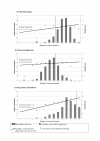Medication knowledge, certainty, and risk of errors in health care: a cross-sectional study
- PMID: 21791106
- PMCID: PMC3162500
- DOI: 10.1186/1472-6963-11-175
Medication knowledge, certainty, and risk of errors in health care: a cross-sectional study
Abstract
Background: Medication errors are often involved in reported adverse events. Drug therapy, prescribed by physicians, is mostly carried out by nurses, who are expected to master all aspects of medication. Research has revealed the need for improved knowledge in drug dose calculation, and medication knowledge as a whole is poorly investigated. The purpose of this survey was to study registered nurses' medication knowledge, certainty and estimated risk of errors, and to explore factors associated with good results.
Methods: Nurses from hospitals and primary health care establishments were invited to carry out a multiple-choice test in pharmacology, drug management and drug dose calculations (score range 0-14). Self-estimated certainty in each answer was recorded, graded from 0 = very uncertain to 3 = very certain. Background characteristics and sense of coping were recorded. Risk of error was estimated by combining knowledge and certainty scores. The results are presented as mean (±SD).
Results: Two-hundred and three registered nurses participated (including 16 males), aged 42.0 (9.3) years with a working experience of 12.4 (9.2) years. Knowledge scores in pharmacology, drug management and drug dose calculations were 10.3 (1.6), 7.5 (1.6), and 11.2 (2.0), respectively, and certainty scores were 1.8 (0.4), 1.9 (0.5), and 2.0 (0.6), respectively. Fifteen percent of the total answers showed a high risk of error, with 25% in drug management. Independent factors associated with high medication knowledge were working in hospitals (p < 0.001), postgraduate specialization (p = 0.01) and completion of courses in drug management (p < 0.01).
Conclusions: Medication knowledge was found to be unsatisfactory among practicing nurses, with a significant risk for medication errors. The study revealed a need to improve the nurses' basic knowledge, especially when referring to drug management.
Figures
References
-
- To Err is Human. Building a Safer Health System. Washington, DC: National Academy Press; 2000. - PubMed
-
- Report 2001-2007 for MedEvent (Meldesentralen) - the Reporting System for Adverse Events in Specialized Health Services. Norwegian Board of Health; 2008.
-
- Regulation on National Frames for Bachelor Education in Nursing. Ministry of Education and Research, Norway; 2008.
Publication types
MeSH terms
LinkOut - more resources
Full Text Sources
Medical
Molecular Biology Databases



